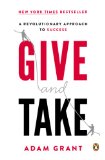Summary | Excerpt | Reading Guide | Reviews | Beyond the Book | Readalikes | Genres & Themes | Author Bio

Critics' Opinion:
Readers' Opinion:
First Published:
Apr 2013, 320 pages
Paperback:
Mar 2014, 320 pages
 Book Reviewed by:
Book Reviewed by:
Jennifer G Wilder
Buy This Book
But Hornik is the opposite of a taker; he's a giver. In the workplace, givers are a relatively rare breed. They tilt reciprocity in the other direction, preferring to give more than they get. Whereas takers tend to be self-focused, evaluating what other people can offer them, givers are other-focused, paying more attention to what other people need from them. These preferences aren't about money: givers and takers aren't distinguished by how much they donate to charity or the compensation that they command from their employers. Rather, givers and takers differ in their attitudes and actions toward other people. If you're a taker, you help others strategically, when the benefits to you outweigh the personal costs. If you're a giver, you might use a different cost-benefit analysis: you help whenever the benefits to others exceed the personal costs. Alternatively, you might not think about the personal costs at all, helping others without expecting anything in return. If you're a giver at work, you simply strive to be generous in sharing your time, energy, knowledge, skills, ideas, and connections with other people who can benefit from them.
It's tempting to reserve the giver label for larger-than-life heroes such as Mother Teresa or Mahatma Gandhi, but being a giver doesn't require extraordinary acts of sacrifice. It just involves a focus on acting in the interests of others, such as by giving help, providing mentoring, sharing credit, or making connections for others. Outside the workplace, this type of behavior is quite common. According to research led by Yale psychologist Margaret Clark, most people act like givers in close relationships. In marriages and friendships, we contribute whenever we can without keeping score.
But in the workplace, give and take becomes more complicated. Professionally, few of us act purely like givers or takers, adopting a third style instead. We become matchers, striving to preserve an equal balance of giving and getting. Matchers operate on the principle of fairness: when they help others, they protect themselves by seeking reciprocity. If you're a matcher, you believe in tit for tat, and your relationships are governed by even exchanges of favors.
Giving, taking, and matching are three fundamental styles of social interaction, but the lines between them aren't hard and fast. You might find that you shift from one reciprocity style to another as you travel across different work roles and relationships. It wouldn't be surprising if you act like 3a taker when negotiating your salary, a giver when mentoring someone with less experience than you, and a matcher when sharing expertise with a colleague. But evidence shows that at work, the vast majority of people develop a primary reciprocity style, which captures how they approach most of the people most of the time. And this primary style can play as much of a role in our success as hard work, talent, and luck.
In fact, the patterns of success based on reciprocity styles are remarkably clear. If I asked you to guess who's the most likely to end up at the bottom of the success ladder, what would you say—takers, givers, or matchers? Professionally, all three reciprocity styles have their own benefits and drawbacks. But there's one style that proves more costly than the other two. Based on David Hornik's story, you might predict that givers achieve the worst results—and you'd be right. Research demonstrates that givers sink to the bottom of the success ladder. Across a wide range of important occupations, givers are at a disadvantage: they make others better off but sacrifice their own success in the process.
In the world of engineering, the least productive and effective engineers are givers. In one study, when more than 160 professional engineers in California rated one another on help given and received, the least successful engineers were those who gave more than they received. These givers had the worst objective scores in their firm for the number of tasks, technical reports, and drawings completed—not to mention errors made, deadlines missed, and money wasted. Going out of their way to help others prevented them from getting their own work done.
Excerpted from Give and Take by Adam M Grant. Copyright © 2013 by Adam M Grant. Excerpted by permission of Viking. All rights reserved. No part of this excerpt may be reproduced or reprinted without permission in writing from the publisher.





The Funeral Cryer by Wenyan Lu
Debut novelist Wenyan Lu brings us this witty yet profound story about one woman's midlife reawakening in contemporary rural China.
Your guide toexceptional books
BookBrowse seeks out and recommends the best in contemporary fiction and nonfiction—books that not only engage and entertain but also deepen our understanding of ourselves and the world around us.